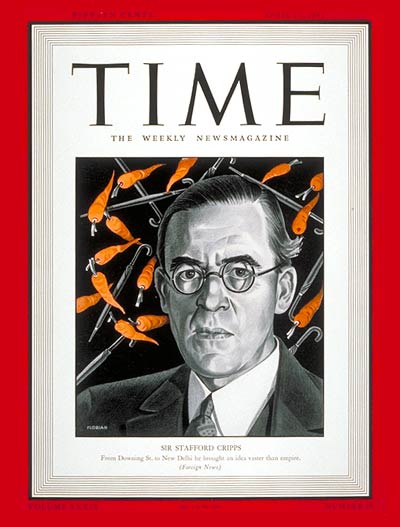The Secret Mission of Stafford Cripps

Giesler: “England’s diplomats had already tried to strengthen the encirclement by adding Russia’s power.”
Sir Stafford Cripps, an ardent Marxist, made the Time cover on Nov. 10, 1946. In spite of being expelled from his own labor Party in early 1939 for organizing a Popular Front of Liberals, Laborites and Communists to try to bring down the Chamberlain Government, he offered his services to that government at the outbreak of war. He was ignored, but the next thing Britain knew, he was on a trip around the world, calling on Molotov, Nehru and Roosevelt. Some speculated he was on a secret mission for the Chamberlain Government, the objective of which was to get Stalin to sign a mutual defense pact with Britain. Others believed it was Churchill, who later appointed Cripps to be his Ambassador to Moscow, who arranged the trip. But was this his real mission? Or was it to drag out talks and negotiations with Britain in the hope that either Hitler or Stalin would start their war and bleed each other to the advantage of Great Britain?
On this issue, historians are still divided; pertinent documents are still locked in secret archives. Stalin may have become suspicious of Britain’s game because he suddenly invited the Germans to send a plenipotentiary emissary to Moscow. Hitler sent Ribbentropp and they signed the Molotov-Ribbentropp non-aggression pact on August 23, 1939.
In one of his last meetings with Cripps, Stalin told him, “I never detected a desire in German politicians to absorb a European country. I do not believe the Soviet Union is threatened by German military successes.” Source: Rolf Dieter Mueller, Der 2.Weltkrieg 1939-1945 Band 21, Verlag Klett-Cotta, Stuttgart, 2004.
Category
World War II- Printer-friendly version
- 10602 reads










Comments
The British were indeed just deceiving their Sovjet partner
on July 23, 1939 Halifax informed Maiskiy, the Soviet ambassador in Great Britain, that the Government of His Majesty was ready for negotiations. All the delaying tactics were used. For example, the joint delegation
went to Russia by sea, not by plane. It would be a mistake to suggest that the military mission representing two major maritime nations decided to
board a fast cruiser. The delegation preferred the “City of Exeter”, a slowspeed passenger ship. It looks like a trifle, but it took the ship five or six days to reach Russia…
As a result, the negotiations began only on August 11. The composition of the delegation is noteworthy, too. The USSR was represented by the highest military ranks: Minister of Defense K. E. Voroshilov, the Chief of General Staff B. M. Shaposhnikov, the Naval Force Commander N. G. Kuznetsov and the Air Force Commander A. D. Loktionov. Britain and France were represented by “second-rate” generals. This is no coincidence. The minister of defense was not the same as General “Asshurl”. The delaying tactics of the delegation might be even more “efficient”, if it had no subscription right. The French General Doumenc had credentials “to make agreements concerning all questions related to cooperation between the armed forces of both the sides”, while the British Admiral Reginald Drax… had no letter of authorization at all!
Source: Who made Hitler attack Stalin by N Starikov. p260